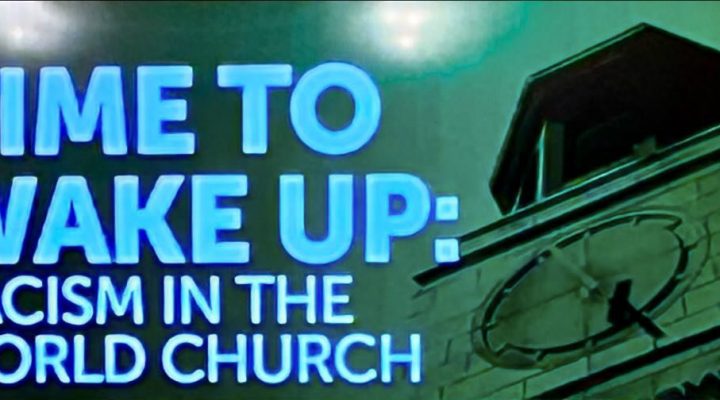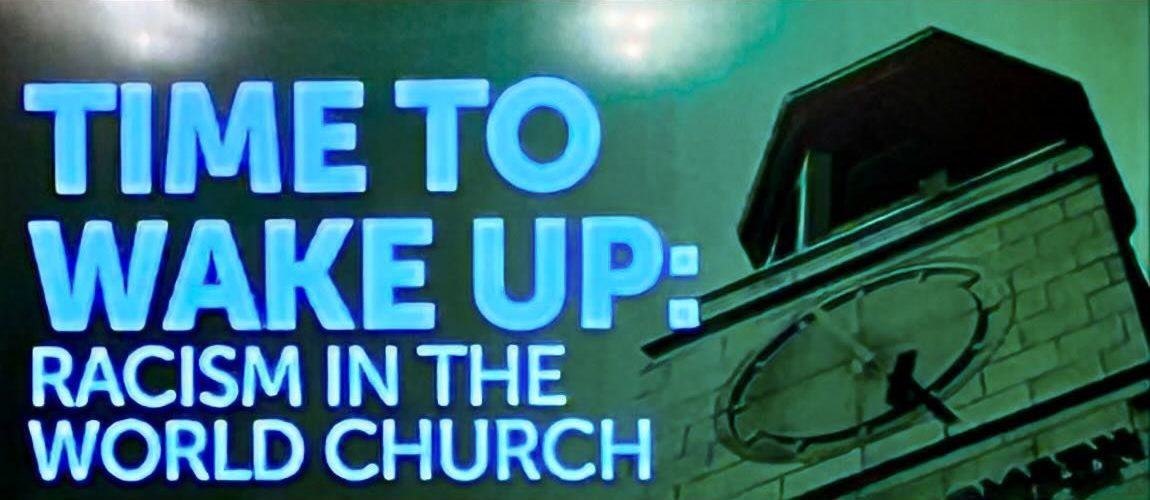White supremacy has become so subtle within Christianity that many white Christians cannot see that racism exists within their churches, Anthony Reddie said during a conference hosted by Baylor University’s George W. Truett Seminary.
“The most egregious thing that we have to wrestle with is the normalization of white supremacy,” said Reddie, professor of Black theology at the University of Oxford in England, in his Feb. 15 keynote for “Time to Wake Up: Racism in the World Church.”
White supremacy has “become so hard and so normalized that we don’t even recognize it in our midst, and the way in which it has distorted the very fabric of what we call Christianity and the nature of church,” said Reddie, author of Introducing James H. Cone: A Personal Exploration.
The conference is the third in a three-year sequence of programs exposing racism in the white church and pursuing God’s healing for the harm it causes. Other speakers included Walter Kim, president of the National Association of Evangelicals; Ralph Douglas West, founding pastor of Church Without Walls in Houston; and Mimi Haddad, president of CBE International.
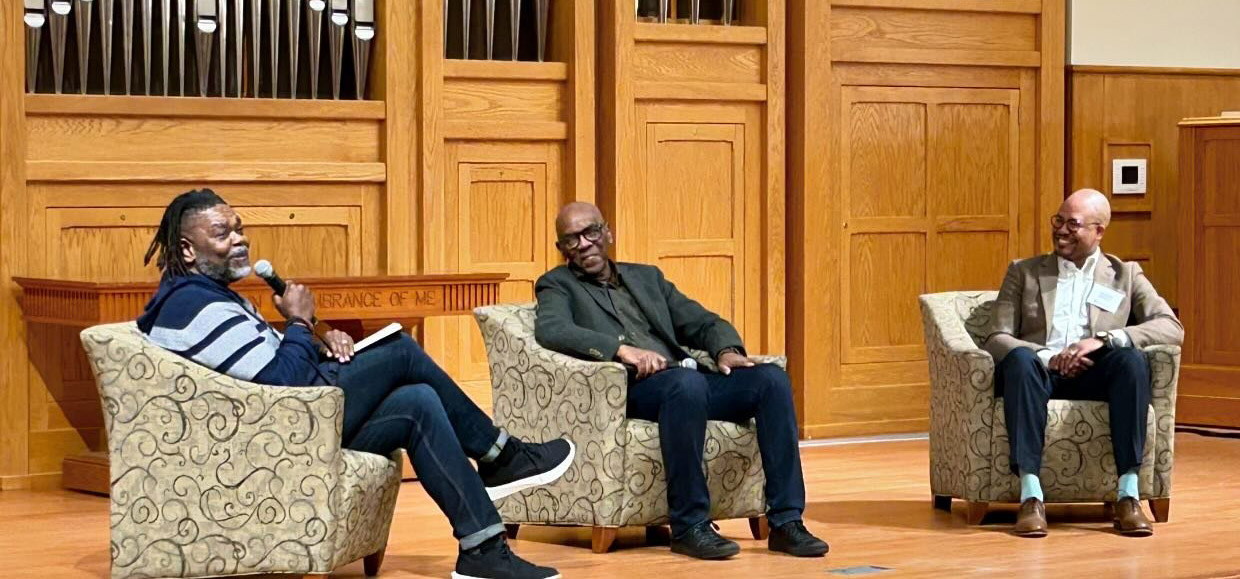
Sean Palmer, Jimi Calhoun, Timothy Peoples speak at the conference.
The symposium was designed to inspire anti-racism work within the church and to urge white Christians to pursue “continuing remorse and repentance,” said event organizer Greg Garrett, a professor of English at Baylor and a BNG columnist. “This is something that’s circular and I find it happening at every stage of this work, and I find it happening continuously. Without repentance, there can be no repair.”
But confronting white racism is a tall order in a church that became part of the fabric of empire in the fourth and fifth centuries, Reddie said in his address, titled “Being Anti-Racist and Not Just Non-Racist.”
Christianity transformed from a religion for the oppressed into an implement white nations used to seize the lands of indigenous populations around the world, he said.
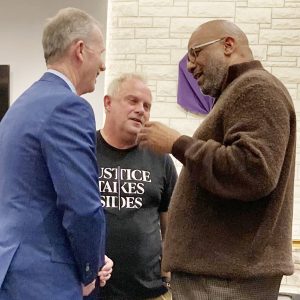
Anthony Reddie greets Todd Still (left) and Greg Garrett
The roots of this transformation came early in church history, he said, as Christians came to blame the Jews for killing Jesus rather than naming Pontius Pilate and the Roman Empire he represented. “Pilate represents white supremacy, and white supremacy now becomes normalized and effectively becomes the religion of Jesus, the religion of God,” Reddie asserted.
White Christians through centuries increasingly denied that Jesus was Jewish, he continued. “The truth is our supersessionism, our replacing of his Jewish identity, enables the reproduction of antisemitism, but more importantly it then allows us to cast blame on the Jews and not on Pontius Pilate.”
That’s why few white Christians flinched at the claim that Jesus called European and American Christians to travel the globe to oppress brown- and Black-skinned people, he said, explaining that a Christianity suffused with white supremacy enabled plantation owners in the American South to see no contradiction between their faith and owning other human beings. “They saw people who are other as inferior and that it was OK to kill or enslave them for their own good.”
Those attitudes clearly continue to exist and in the U.S. are evident in the rise of Trumpism, the British scholar said. “Here’s the thing about white supremacy: its evil genius is to convince poor people that rich, white folk really care about them, and their enemy is not those who have created a system that will exploit them, but the immigrants and other minorities who are taking the little they have.”
“Its evil genius is to convince poor people that rich, white folk really care about them.”
This explains why poor whites are given to demanding that America be taken back, he said. “But when did white people ever lose it to take it back?”
At the very least, white Christians must acknowledge there is a problem of race in their churches and that their faith has become antithetical to the gospel Jesus preached, Reddie said. “It was created as a movement for those who are marginalized and oppressed. Jesus himself embodies that lived experience. He was a colonized, oppressed man in his own country.”
Racism is hard to eradicate because it “has reared its ugly head” repeatedly throughout time, said Truett Seminary Dean Todd Still in opening the symposium.
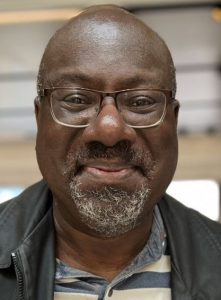
Anthony Reddie
Prejudice has become all too pervasive in the world church, he explained. “Scripture not only declares that all human beings are made in the image and likeness of God and are to be remade in the image and likeness of Christ, but it also contends time and again that God is a God who does not show partiality or favoritism.”
He added: “Christ followers are called not only to not show partiality or favoritism but are to repent when they commit what the Bible speaks of as a sin that is subject to divine judgment.”
Garrett said his model for anti-racism work relies heavily on the writing of author and historian Jemar Tisby and his book The Color of Compromise: The Truth about the American Church’s Complicity in Racism.
According to Tisby, for white people to engage in ant-racism requires an acknowledgement of its existence, the building of relationships with non-whites and a commitment to working against racism.
“There are all sorts of commitments people can make,” Garrett said. “You can share pulpits with the church that consists of people from a different racial identity than your own. Share a table, fellowship with them. You can learn about a theology that’s from a different tradition than your own. You can support the businesses and institutions and churches of people whose identities are different from your own.”
Related articles:
Being Christian and being anti-racist are the same thing, West declares
Return to the radical forgiveness and self-sacrifice of the gospel, Haddad says
‘Both of these Jameses are speaking into 2023 in ways that are important and necessary’

